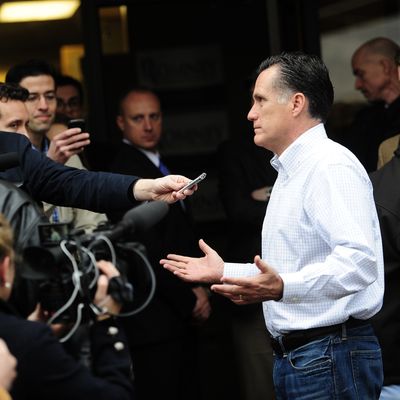
Friday was not a great day for political journalism. The story driving campaign news was that President Obama said “the private sector is doing fine,” which he meant in the same basic way that I did this week when I was slowly recovering from a horrendous head cold and told people I was “fine,” but which Republicans seized on as if to suggest he meant “ideal.” But what set me off (on an extended Twitter rant, in fact) was actually not that story but a Buzzfeed article headlined “Mitt Romney Struggles To Identify A Donut.” They’re sort of the same thing.
The story is a short video clip of Romney pointing at a plate of delicious-looking doughnuts and saying, “Can you see that one of those chocolate, um, uh, chocolate goodies finds its way to our ride?” He was almost certainly not struggling to identify a doughnut. Maybe he was looking for a more specific word to identify the subgenre of doughnut he was pointing at. Maybe he was trying to come up with a more general term than doughnut, and he settled on “goodies.” In any case, I am nearly certain Romney was not unfamiliar with doughnuts.
Did Buzzfeed think Romney didn’t know what a doughnut was? I would also guess the answer is: almost certainly not. Rather, Buzzfeed was engaged in a kind of meta judgment. Somebody else — liberal bloggers, Democrats, an MSNBC host — would use the video to make the case that Romney didn’t know what a doughnut was. Romney, as we all know, is extremely wealthy and often out of touch with the realities of middle-class existence, so it could be claimed that he couldn’t identify a doughnut, and it would become another piece of evidence for what we all know to be true about Romney, and surely is true, even though it is not actually evidence of anything.
It’s obviously true that political campaigns will take their opponents’ statements out of context. That is probably unavoidable. The key step I’m focusing on here is when the journalist internalizes the work of the oppo researcher. Perhaps, in the end, the dumbest, least fair, most context-free interpretation of the line will ultimately prevail. But when journalists assume this will happen and make no effort to fight against that process, we go from merely reporting on the stupidity of politics to becoming accomplices of it.
I don’t mean to single out Buzzfeed here, which I generally like. Nor do I mean to plead innocence. I went back and looked up my own commentary on a similar Romney gaffe, when he said, “I like being able to fire people who provide services to me.” Romney had previously run a wildly misleading ad depicting Obama quoting the Republicans in a non-friendly way, but presenting the quote as being Obama’s own views. I wrote an item pointing out that Democrats might reverse the trick on Romney. I wrote that it would be a “smear” of Romney and would be taking his words “out of context,” which I think discharged my obligation to note the basic unfairness of the attack but also did, somewhat, assume a smear campaign that hadn’t yet happened. I later wrote a post defending Romney’s like-to-fire-people line as an ode to the benefits of consumer competition.
Anyway, I am not trying to get in the way of anybody’s fun. Some gaffes are really funny. Some are genuinely revealing. My humble suggestion is that, when we cover them, we attempt to explain what the candidate actually meant and not merely do his opponents’ work for him.






























